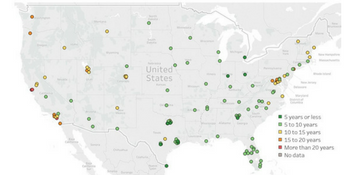Teacher salaries, cost of rent, and home prices: Can teachers afford to live where they teach?
Lack of affordable housing exacerbates the teacher staffing challenges that many school districts face.

Lack of affordable housing exacerbates the teacher staffing challenges that many school districts face.

Do teachers who return to the district they graduated from have a competitive edge over other beginning teachers?

Permit me to draw my inspiration from scripture, referencing the basic human needs of clothes on our backs, food to eat, and a shelter over our heads. How better to discern if in fact teacher salaries are where they need to be? Applying salary data from our Teacher Contract Database, we asked this question: are teachers paid enough to put a roof over their heads?

Teacher salaries are always in the news, but in the last few months we’ve noticed that housing affordability for teachers is in the spotlight, with many school districts exploring ways to support teachers’ ability to rent or purchase homes. This month, we assess the ability of teachers to: 1) rent an apartment, 2) save for a down payment, and 3) make a monthly house payment.

A four-day work week may seem like a good way to attract teachers and address tightening school budgets, but researchers say it might do more harm than good.

As a group, teachers tend to defy the old adage “you can’t go home again,” usually taking jobs within 50 miles of where they went to high school and making that choice at a much higher rate than other professionals. A new study from John Krieg of Western Washington University, and Roddy Theobald and Dan Goldhaber, from the Center for Education Data & Research, may have turned up an even more powerful predictor of where teachers end up working than their home address: where they complete their student teaching.
Looking at where teachers end up working after finishing their preparation at one of six Washington universities, the location of the student teaching placement turned out to be a much stronger predictor of teachers’ first jobs than where they grew up or went to high school. This relationship held strong even when the researchers excluded teachers who were lucky enough to land a job where they student taught. Surprisingly, even teachers who completed their student teaching relatively far away from campus and/or home (though still in the state, an important caveat of this study) were more apt to land in the school district where they had student taught.
This newly discovered relationship should grab the attention of school districts having a tough time finding new teachers. By arranging student teaching partnerships with programs which may not even be anywhere nearby, districts might still be able create a stable and steady pipeline of new teachers.
The study also turned up some disquieting evidence of inequities, with more-qualified student teachers (as measured by student teachers’ GPAs and first-time scores on a credentialing test) being placed disproportionately in more-advantaged schools—and therefore more likely to land their first job in those advantaged schools.
But let’s look at the bright side here. IF teacher prep programs more proactively placed the better student teachers in less advantaged schools, those teachers might be more likely to work in such schools. No new law or reg needed—just recognition by teacher prep of the importance of placing their superstars in the classrooms where they are needed the most.

Research shows that teachers of color positively impact all students, especially students of color, improving their academic achievement, discipline, attendance, graduation rates, and social-emotional outcomes. Despite their positive impact on students, the teaching workforce remains 80% white while students of color now comprise over 50% of public school students.
Teacher diversity is a policy area that will require sustained commitment from states to achieve progress and increase the number of teachers of color in the workforce. This report examines how states are responding to this challenge through policy and funding, providing the first comprehensive analysis of teacher diversity policies across all 50 states and D.C.

Explore the most popular District Trendline posts of 2023, spotlighting topics like paid parental leave benefits, housing costs in relation to teaching salaries, the diversification of the teacher workforce, and more.

Dr. Selma BotmanDr. Botman has dedicated her career to higher education. She previously served as the Vice President for Academic Affairs at the University of Massachusetts, the president of University of Southern Maine, and the provost and Executive Vice Chancellor for Academic Affairs at The City University of New York. Dr. Botman has also taught at the College of the Holy Cross where she was involved in international programs and promoted Middle Eastern studies.
In her current role as Provost and Vice President for Academic Affairs at Yeshiva University, Dr. Botman is working with faculty and deans to expand curricular offerings for both undergraduate and graduate students. Along with her administrative responsibilities, Dr. Botman continues to teach undergraduates in the area of her academic specialty, modern Middle Eastern history and culture.
Dr. Botman holds a BA in Psychology from Brandeis University, a BPhil in Middle Eastern studies from Oxford University, and an AM in Middle Eastern Studies and PhD in History and Middle Eastern Studies from Harvard University.
John ConnollyJohn R. Connolly is the
co-founder and executive director of 1647, a non-profit start up that partners
with schools to implement effective family engagement strategies including
training teachers to conduct home visits.
Prior to founding 1647, John spent six years as a Boston City Councilor
where he chaired the Committee on Education and co-chaired the annual review of
the Boston Public Schools’ budget.
During his time as a City Councilor, John led the effort to reform the
Boston teachers contract, lengthen the school day, and fully staff school-based
social and emotional health services.
John also led a Council investigation that exposed rampant mismanagement
of the Boston Public Schools’ food services department. From 1995-1998, John taught seventh and
eighth grade at the Nativity Mission School on the Lower East Side of Manhattan
and taught sixth grade at the Boston Renaissance Charter School. John has also worked as an attorney at Ropes &
Gray and Hanify & King, P.C. from 2001 – 2007.
John currently serves on the
board of FUEL Education. He formerly
served on the board of Meridian Academy and Action for Boston Community
Development (ABCD).
Hugh NorwoodHugh has been in and around
the education industry as a professor, administrator, marketer and serial
entrepreneur since 1995, with successful tenures at Emerson College, Lesley
University and Laureate Education, Inc., (home of Walden University, Kendall
College, National Technological and others). In 2007, he formed
Trinity Education Group, Inc. as a Maryland S-Corps, and has served as its
President and General Manager since. Hugh is a frequent presenter at
professional education conferences such as NAGAP, AACRAO SEM, SXSW Interactive,
SXSWedu and Connexions. He has held several board positions for corporations,
including his current role as Board Chairman for InSync Education. He is a
founding board member of SXSWedu and held a board position on Rice University’s
OpenStaxx OER Center until 2013. Hugh received his BA summa cum laude from Moravian College (1990) and his Master of Fine
Arts/Creative Writing from Emerson College (1995).
COVID-19, coronavirus, pandemic, learning loss, remote learning, virtual learning, homeschooling, homeschooling online, homeschooling k-12, school closings, education gaps, educational gaps

When the COVID-19 crisis hit, we asked what, if anything, districts had spelled out in their existing policies relevant to teacher work, pay, and leave in situations of emergency school closures. Then we started collecting the new policies districts are adopting for teachers.

We’re excited to bring back the Trendline series with one of our most popular topics: teacher salaries.